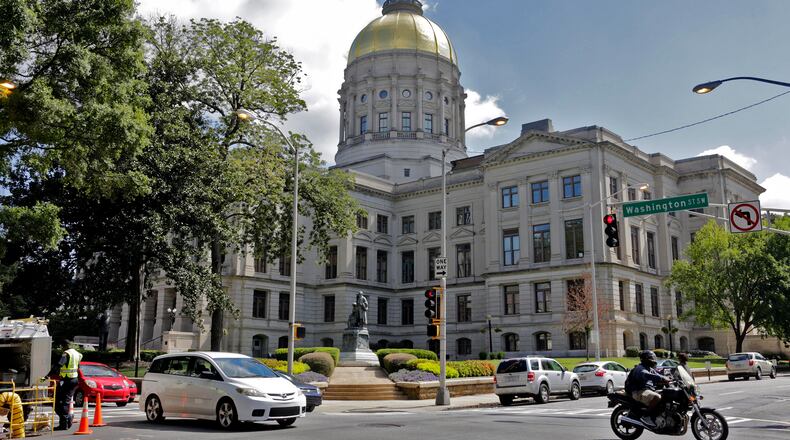A highly touted tax credit program designed to save rural hospitals has thus far been a major disappointment, and now state lawmakers are scrambling for a fix.
Deemed a "lifeline" for struggling rural hospitals, the tax credit program went live Jan. 3, but thus far, donors have applied for less than 2 percent of the available credits. State Rep. Geoff Duncan, R-Cumming, who sponsored legislation last year that created the program, introduced a new bill Thursday aimed at making the credits more attractive. A similar bill was introduced in the Senate.
Duncan's House Bill 54, however, also would require hospitals who pay a consultant to attract donors to disclose the hospital's costs for the professional help, an apparent rebuke to hospitals that have spent generously on one particular consultant, angering key lawmakers.
The key to HB 54 is increasing the value of the tax credit from 70 percent of the donation to 90 percent. Duncan said many corporate donors have balked at only getting a 70 percent return on their contributions.
"Our rural communities cannot afford for this not to be a success," said Duncan, who is considering a bid for statewide office in 2018.
Many rural hospitals have struggled for years. Since 2013, at least five small-town hospitals in Georgia have closed, according to Georgia Health News, an online site that reports on state health care issues.
Lawmakers thought they’d found a way to help keep struggling rural hospitals afloat by offering $180 million in state tax credits to donors who contribute to small-town medical centers.
The idea was to give Georgians and companies a tax break as an incentive to donate to the hospitals.
A tax credit directly reduces the taxes someone owes. Under the law, individuals can get a tax credit worth up to 70 percent of what they donate to a rural hospital, or $2,500, whichever is less. Corporations can get a tax credit worth up to 70 percent of their contribution, or up to 75 percent of their income tax liability.
Qualified hospitals can get up to $4 million in donations eligible for tax credits. The credits will be awarded on a first-come, first-served basis. The state is allocating $50 million for the tax credits next year, $60 million in 2018 and $70 million in 2019.
Thus far, however, 136 taxpayers have submitted requests to the Department of Revenue for only $860,955 in credits.
By contrast, the spending cap for a similar tax break for donors to private school scholarship programs is typically reached the first day it’s offered each year.
Jimmy Lewis, the CEO of Hometown Health, a coalition of rural hospitals, said the tax credit plan has been difficult to sell because donors only get back 70 percent of what they put into hospitals.
“We’ve come to recognize that the bill as passed last year is a great concept,” Lewis said. “The practical parameters built in are a no-go.
“If you are a corporate investment operation looking to invest money, you can’t justify suggesting to your investor that they invest in something where you will lose 30 percent off the top,” he said. “We have to open the debate up to get it going.”
Duncan said he hopes to see his bill move through the process quickly so hospitals can start seeing the benefits. If signed into law, it would be retroactive to Jan. 1, meaning anyone who has already applied for a credit would see the extra bump, too.
Lewis likes Duncan’s bill, which would give donors tax credits worth 90 percent of what they donate. A Senate proposal would allow corporate donors to recoup 100 percent of their donation up to $10,000.
Duncan, however, objects to Senate Bill 14, sponsored by state Sen. Dean Burke, R-Bainbridge, because it treats corporate taxpayers differently from individuals.
“I certainly would not support treating corporations in a more favorable manner than I would a taxpayer, just an average taxpayer,” Duncan said, adding he’s hopeful the two sides can come to an agreement on a “level playing field.”
Duncan’s original 2016 bill would have granted a 90 percent credit, but the Senate balked and in the final minutes of last year’s legislative session a bill passed setting the credit at 70 percent.
Duncan’s new bill would also set up a state oversight for any activities of outside consultants that hospitals hire to help them get the tax break.
Legislative leaders have criticized an Atlanta-area consultant who has signed up two-thirds of the rural hospitals eligible to receive the donations. The consultant gets 6 percent of what donors give to the hospitals for marketing and other administrative help.
Lawmakers said they set the program up in such a way that hospitals shouldn’t need to hire consultants to get the donations.
Jim Kelly, the consultant, says many small hospitals simply don’t have the staff or expertise to run a fundraising campaign and do the paperwork needed to comply with the tax-credit program.
Duncan said his proposal will not prevent any hospital from hiring a consultant.
“I didn’t want to pick winners and losers, and I didn’t want to meddle in the free markets,” Duncan said. “All I wanted to do with this was create transparency.”
Legislative session coverage
To see more of The Atlanta Journal-Constitution's coverage from the Georgia General Assembly's legislative session, go to http://www.myajc.com/georgia-legislature/. To track particular bills and resolutions, check out the Georgia Legislative Navigator at http://legislativenavigator.myajc.com/. You can also follow the proceedings on Twitter at http://twitter.com/GAPoliticsNews or on Facebook at http://facebook.com/gapoliticsnewsnow.
Keep Reading
The Latest
Featured




